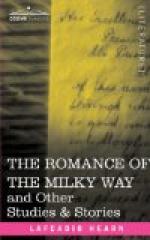* * * * *
—This memory of more than twenty years ago, and the extraordinary thrill of the moment, were recently revived for me by the reading of the essay “Ultimate Questions,” in the last and not least precious volume bequeathed us by the world’s greatest thinker. The essay contains his final utterance about the riddle of life and death, as that riddle presented itself to his vast mind in the dusk of a lifetime of intellectual toil. Certainly the substance of what he had to tell us might have been inferred from the Synthetic Philosophy; but the particular interest of this last essay is made by the writer’s expression of personal sentiment regarding the problem that troubles all deep thinkers. Perhaps few of us could have remained satisfied with his purely scientific position. Even while fully accepting his declaration of the identity of the power that “wells up in us under the form of consciousness” with that Power Unknowable which shapes all things, most disciples of the master must have longed for some chance to ask him directly, “But how do you feel in regard to the prospect of personal dissolution?” And this merely emotional question he has answered as frankly and as fully as any of us could have desired,—perhaps even more frankly. “Old people,” he remarks apologetically, “must have many reflections in common. Doubtless one which I have now in mind is very familiar. For years past, when watching the unfolding buds in the spring, there has arisen the thought, ’Shall I ever again see the buds unfold? Shall I ever again be awakened at dawn by the song of the thrush?’ Now that the end is not likely to be long postponed, there results an increasing tendency to meditate upon ultimate questions."... Then he tells us that these ultimate questions—“of the How and the Why, of the Whence and the Whither”—occupy much more space in the minds of those who cannot accept the creed of Christendom, than the current conception fills in the minds of the majority of men. The enormity of the problem of existence becomes manifest only to those who have permitted themselves to think freely and widely and deeply, with all such aids to thought as exact science can furnish; and the larger the knowledge of the thinker, the more pressing and tremendous the problem appears, and the more hopelessly unanswerable. To Herbert Spencer himself it must have assumed a vastness beyond the apprehension of the average mind; and it weighed upon him more and more inexorably the nearer he approached to death. He could not avoid the conviction—plainly suggested in his magnificent Psychology and in other volumes of his great work—that there exists no rational evidence for any belief in the continuance of conscious personality after death:—




